#july monarchy
Text
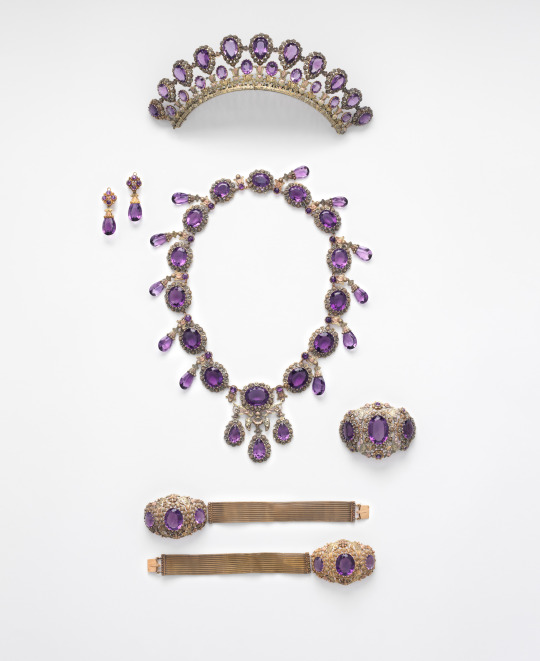
Parure
c.1830
Paris, France
The MET (Accession Number: 32.100.320)
#parure#jewelry#historical fashion#fashion history#1830s#romantic era#amethyst#gold#france#july monarchy#1830#19th century#necklace#bracelet#brooch#earrings#comb#accessories#the met#popular
1K notes
·
View notes
Text
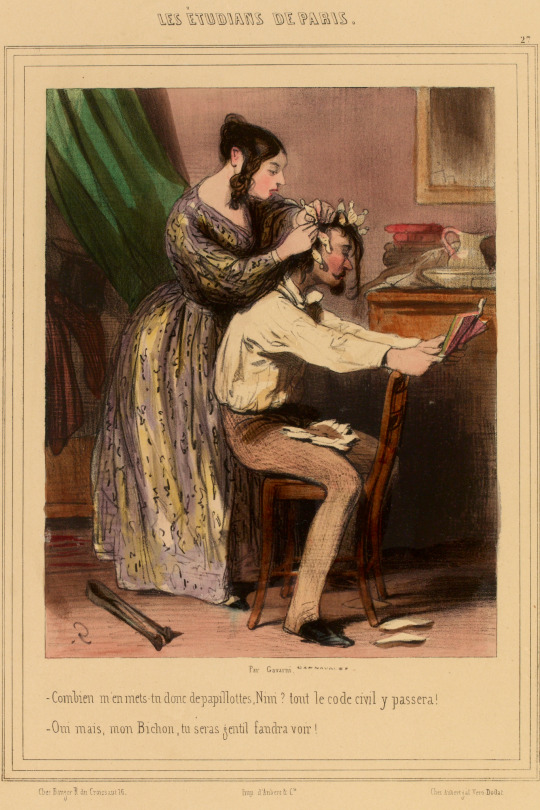
Another wonderful and adorable men's haircurling scene circa 1840 by Paul Gavarni, this one in high quality! (Paris Musées). Dated 1839-1841, in the "Students of Paris" series, the dialog goes something like:
How many papillotes are you going to give me, Nini? I'll have read the entire civil code!
Yes but, sweetie, you're going to look so nice!
He has papillotes on his lap, there are curling tongs and more papillotes on the floor. His hair is chin-length, showing how long men's hair is at this time, he's in his shirtsleeves—it's so intimate and cute.
eta: thanks to @daffenger and @sainteverge, who suggested a better translation of the dialog that makes it even more amusing: he's actually saying that they're about to run out of the civil code, which is being used to make his curl papers!
#paul gavarni#1830s#1840s#men's fashion#july monarchy#historical hairstyles#historical hair curling#papillotes#hair curling#looks much more 1840s than 1830s#i love them your honor#she looks so nurturing#i love you mister gavarni
2K notes
·
View notes
Text
Veneration of the dead Napoleon in peasant villages, working class quarters and among the general public in 1830s France
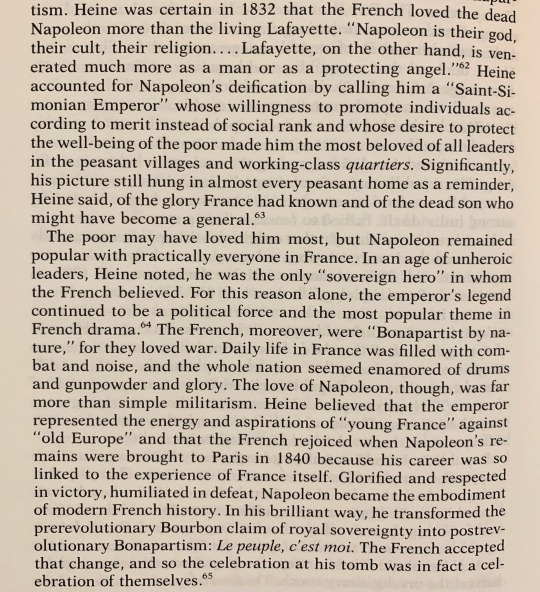
Threshold of a New World: Intellectuals and the Exile Experience in Paris, 1830-1848
By Lloyd S. Kramer
#Heinrich heine#heine#Napoleon#napoleon bonaparte#Lafayette#napoleonic era#napoleonic#restoration#July monarchy#first french empire#french empire#19th century#1800s#history#france#french revolution#book pic#quotes#quote#book#ref#reference
52 notes
·
View notes
Note
Just wondering if you have a take on Louis Philippe I, King of the French a.k.a. the Citizen King? Seems like historians don't totally agree on him as either a man or a monarch.
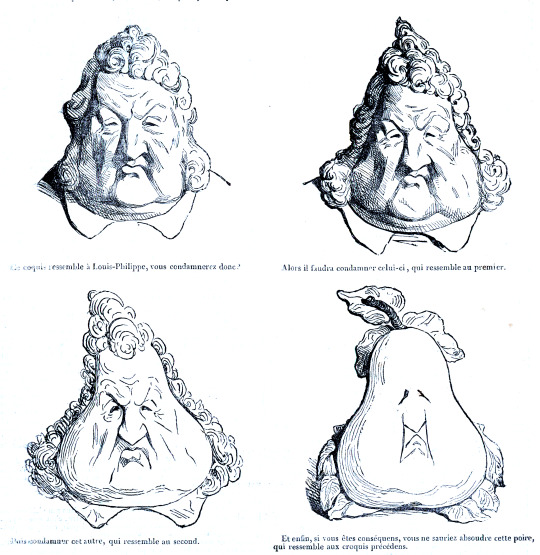
An impressive failure, squandering an enormous amount of goodwill and political capital over 18 years to accomplish what? Enfranchising 1% of the population instead of .5% and telling the 99% to "enrichissez-vous"? Fighting parliamentarianism to the last? Eliminating and then restoring censorship of the press? Crushing labor unions and republican societies? Handing out sweetheart contracts to the haut bourgeoisie who supported him? A colonial empire in Algeria?
31 notes
·
View notes
Text
Being the son of marshal Soult ...

... may not always have been fun for young Napoléon Hector. Not only because growing up under such an overbearing personality could be considered quite challenging in the first place, but also because Soult senior, at all times of his career, had a real knack for making enemies all over the place. This was especially true for the last period of his life, that he spent as minister in the July Monarchy.
The July Monarchy, from my very layman perspective, seems to have been a compromise by its very nature: a bit of First Empire nostalgia for the bonapartists, a bit of constitution and parliamentary debates for the republicans, a bit of a Bourbon monarch for the royalists. And of course, as is always the case with compromises, everybody hated it.
On 13 May 1833, Marshal Soult, as minister of War, in parliament proposed some changes to the army administration: Conscripts were to serve for three years before returning to their homes and forming an army reserve that could be called upon in times of need. This proposal was vehemently critisized by the bonapartist party, namely one former colonel Armand de Bricqueville, who saw in this change a deliberate attempt to destroy what he called "regimental spirit", the lack of which in the long run would make the army nothing but an obedient tool in the hands of the government. (Which apparently was a horrible thing.) Bricqueville, you have to give it to him, managed to put into his speech every personal insult against Soult he could think of, from accusing him of trying to bring back the Restauration, of having supported the ultra-royalists, to having been the cause for the defeat at Waterloo, even hinting at Soult having betrayed Napoleon. Some excerpts:
[...] Ah, you're right, weaken the country's forces, because they're all against you! [Call to order] Break the national instruments, [...] bring about the Restoration, that is your task, and probably your goal! [Repeated call to order] [… About Napoleon’s army at Waterloo] Its leaders were tired of war and were no longer physically or morally fit to wage it. Staff were filled with traitors [...] The loss of the battle was mainly due to that inconceivable negligence that led to essential orders not reaching General Grouchy [...], which made everyone say that the victory would have been ours if Marshal Berthier had been the major-general. [Exclamations in the centre, Marshal Soult salutes]. Unfortunately, the man who replaced him had, in 1814, in the service of the Bourbons, mistreated the old army more than anyone else. [New exclamations] He had just become intimately acquainted with the Vendéens and the Chouans of Quiberon […] There are men who, in enemy territory, have made the French name abhorred by their exactions; I could name some who in their rout did not lose a single piece of the gold that victory had brought them; who, as friends of the fine arts, we must do them justice, brought admirable masterpieces to France, and finally brought back treasures on the backs of mules, but not a single caisson or barrel of cannon. [Murmurs]
The last part obviously alluding to Soult’s retreat from Portugal in spring 1809, but mixing it with the retreat from Andalusia in 1812 (that had been anything but a rout).
I guess the overall tone of that debate gets quite clear from those snippets. Interestingly, Soult actually seemed to want to answer, but two of his colleagues prevented him from honouring these personal insults with a reply.
And that’s where Napoléon Hector, the Marquis de Dalmatie, by now 30 years old, takes the stage. Because the next thing Bricqueville received (presumably after many congratulations from his bonapartist colleagues) was a challenge to a duel from Marshal Soult’s son. It was fought on 14 May, and the four witnesses (Clausel and Jacqueminot for Soult Junior, Exelmans and Bacot for Bricqueville) put this official protocol into the Journal de débats of 15 March:
The direct attacks of M. le colonel de Bricqueville against M. the marshal minister of war in his speech of Thursday 13 June in the Chambre des Députés, having made it essential for M. the marquis de Dalmatie to seek satisfaction, a meeting took place this morning in the Bois de Boulogne between these honourable adversaries, who chose the sword as their weapon, and began a fight which lasted more than ten minutes. M. de Dalmatie hit a stone and fell backwards. Monsieur de Bricqueville hurried to offer him his hand and put him back on the right ground. The fight started again. This time, M. de Bricqueville's sword, having become entangled in M. de Dalmatie's after a fairly long struggle, slipped out of his hands. He advanced straight towards his opponent, who eagerly gave him back his weapon. After a rest necessitated by such a vicious attack, the fight resumed; the adversaries rushed at each other and soon came to grips face to face. In this situation, the witnesses, who were, on one side for the Marquis de Dalmatie, Marshal Clausel and General Jacquéminot, and on the other side General Excelmans and Mr César Bacot, Member of Parliament, threw themselves between them and declared that, as men of honour, they should not allow such a stubborn engagement to continue. The two combatants submitted to this decision and went their separate ways, showing each other frank and loyal esteem.
Paris, 14 June 1833.
To me this sounds a lot as if all four of the witnesses were mostly there in order to watch the two idiots stumble around a little and to make sure that nobody got really hurt. There are different reports about this incident, some even claiming that Bricqueville actually did injure the marquis de Dalmatie or that the latter was fighting in earnest. Anyway, the official report is the one above.
In how far Soult himself was behind or informed of the duel, I do not know. Gotteri seems to not mention this at all in her book, and Brun de Villeret at the time was not in Paris. Only why Soult himself did not make the challenge seems clear: He was already 64 years old in 1833 and rather not fit for hand-to-hand combat.
But this was not the only incident in which a dissatisfied officer expected the son to stand in for his father: a certain maréchal-de-camp Hulot d’Aussery (or d’Osery; a distant relative of one of Soult’s former aides) that same year asked for an interview with the marquis de Dalmatie and, as soon as he was received, challenged him to a duel, because Soult as minister of War had not made Hulot a lieuténant-général yet, as Soult’s predecessor Gérard had promised. Napoléon-Hector, presumably somewhat confused (he was neither involved in the affairs of the ministry nor was he even part of the military, but had become a diplomat) refused the challenge but promised to talk to his father about it. Soult senior sent one of his aides to Hulot who tried to talk some sense into him, but to no avail. (According to one anecdote, Soult did not take the whole thing very serious, telling Hulot: So sorry, but I only do duels with cannonfire.)
Disgruntled Hulot did not let it go. The minister of the Interior interfered next, telling Hulot to stop that nonsense. Hulot then sent two highly insulting letters to Soult junior, probably hoping Napoléon Héctor would feel offended enough to now accept the challenge. When both father and son Soult instead decided to sigh, shrug and ignore the whole matter, Hulot had the letters published in the republican journal La Tribune:
Marquis of Dalmatia, you are an insolent coward! Wherever I meet you, I will stamp your face with the seal of infamy! If life is dear to you, then live at this price...
Nope. Being the son of marshal Soult, probably not always fun.
13 notes
·
View notes
Text
Richard III and The July Revolution
When I finally saw the Ian McKellan Richard III film I was a bit disappointed, his performance was great and there were interesting ideas to come from the concept of adapting this play to the 1930s. But those ideas weren’t explored fully and the other performances were kinda dull.
But my biggest pet peeve was removing Margaret of Anjou, now her presence in this play is it’s most explicit historical inaccuracy, the historical Margaret was not in England anymore during any of this time period, but an adaptation that removes it from even the pretense of being about actual history doesn’t need to worry about that. As a story, her functioning as a Prophetess of Doom is a lot of why this play works and is why I’m glad the first version of it I ever watched was The Hollow Crown series where she’s played by Sophi Okonedo.
Thinking about the idea of adapting this play to other time periods got me to thinking as a part-time Francophile about the idea of using it as a framing device for a fictionalization of the July Revolution of 1830.
Charles X of France and this popular view of Richard III have in common being the youngest of three brothers who was more of a blatant tyrant then his older brothers and the end of his Dynasty overthrown in a Revolution that could also be viewed as more of a Coup.
Charles was also rumored to have had an extramarital affair with Marie Antionette. Meanwhile he never married a daughter of Marie Antionette but his son did.
Orleans would thus fill the role of Richmond and everyone’s favorite crossover plot-line between the American and French Revolution the Marquis de Lafayette can fill the role of Lord Stanley crowning the new King at the end.
But here’s where specifically my Shadowmen interests come into play. The quasi Prophetess role of Margaret of Anjou can be filled by Josephine Balsamo the Countess of Cagliostro. As a daughter of Josephine she too has a connection to a recently overthrown dynasty.
#Josephine Balsamo#Countess Cagliostro#Margaret of Anjou#Richard III#July Revolution#July Monarchy#Charles X#Francophile#Olreanist#Marie Antionette
2 notes
·
View notes
Text
Louis Philippe I vs Charles X (It's King vs King.) During the July Revolution.
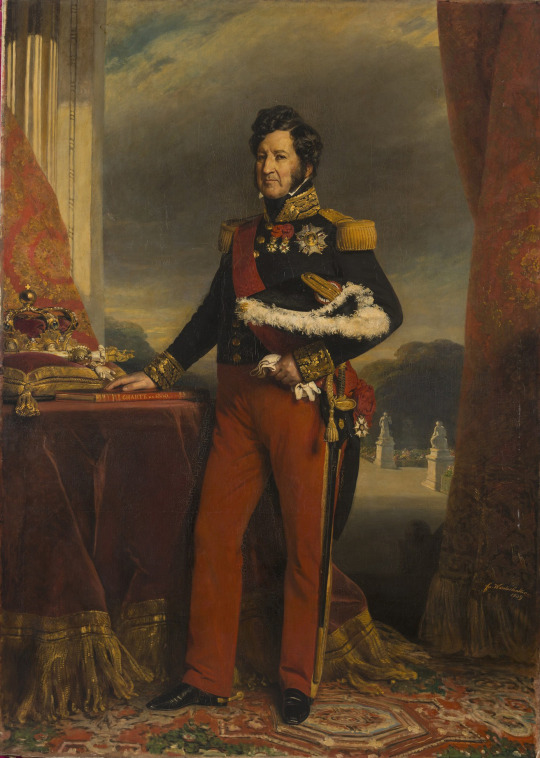
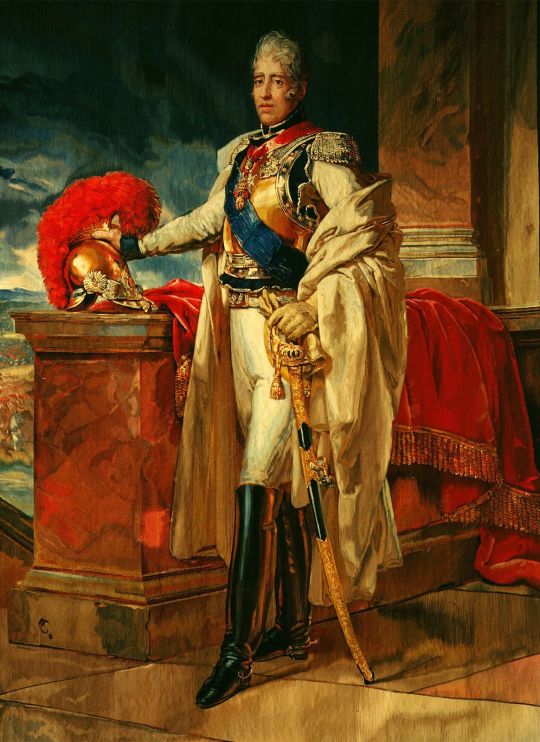
This is a revolution between Kings. First one is Louis Philippe I, and the Second one i is Charles X. The fight between the Kings of France.
#kingdom of france#July Revolution#July monarchy#Bourbon restoration#Charles X#Louis Philippe I#Revolutions of 1830#History#Historical#King#Kings
2 notes
·
View notes
Text

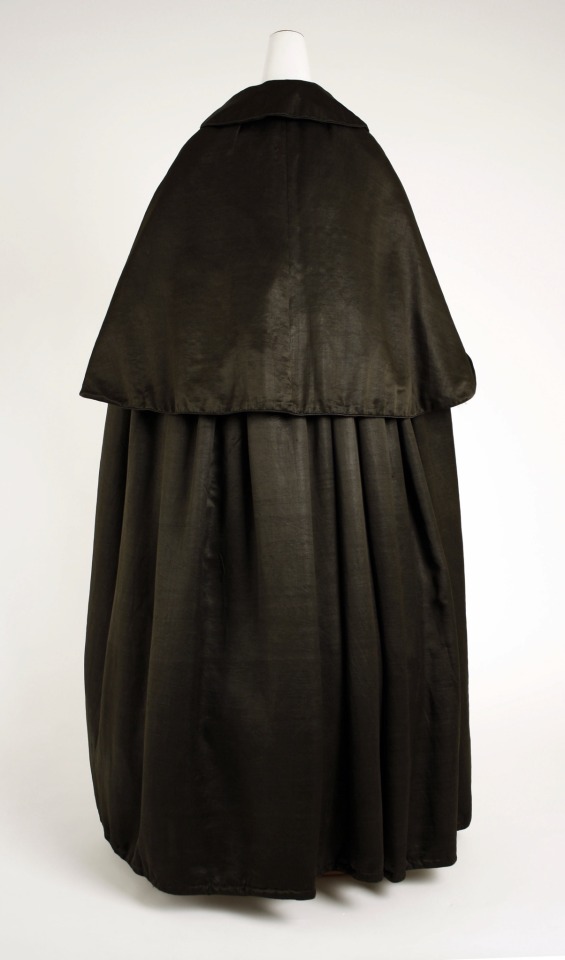
Black Silk Mantle, ca. 1835, probably French.
Met Museum.
#met museum#19th century#mantle#silk#womenswear#france#french#1835#1830s#extant garments#July monarchy#1830s France
2 notes
·
View notes
Text
The Uses of History, 7 – From France 1812 to Russia, 1917, 4
The Uses of History, 7 – From France 1812 to Russia, 1917, 4
(Image credit: Web Gallery of Art)
Following the failure of the Decembrist Revolt in 1825 and the accession of Tsar Nicholas I, the vast Russian Empire was locked into extreme reactionarianism. The reformist elements were suppressed and no license was permitted in expressing contrary views to Divine Right for the Tsar under God’s anointing, aristocratic privilege as its corollary, as well as the…

View On WordPress
#July Monarchy#King Charles X#Louis-Philippe#Marmont#Revolution of 1830#Russian émigrés in France#Swiss Guard
2 notes
·
View notes
Photo
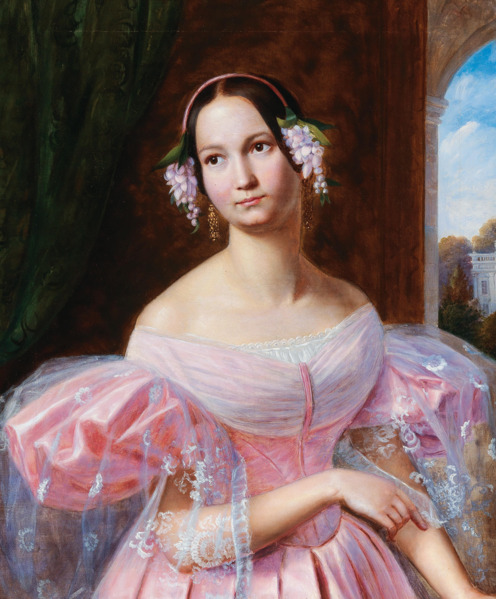
Portrait of Princess Helene of Mecklenburg-Schwerin (1814-1858) as a bride, attributed to Gaston Lenthe, c. 1837
2 notes
·
View notes
Text


#francois guizot#based department#based#gigachad#19th century#laissez faire#enrichissez vous#july monarchy#orleanism
1 note
·
View note
Text
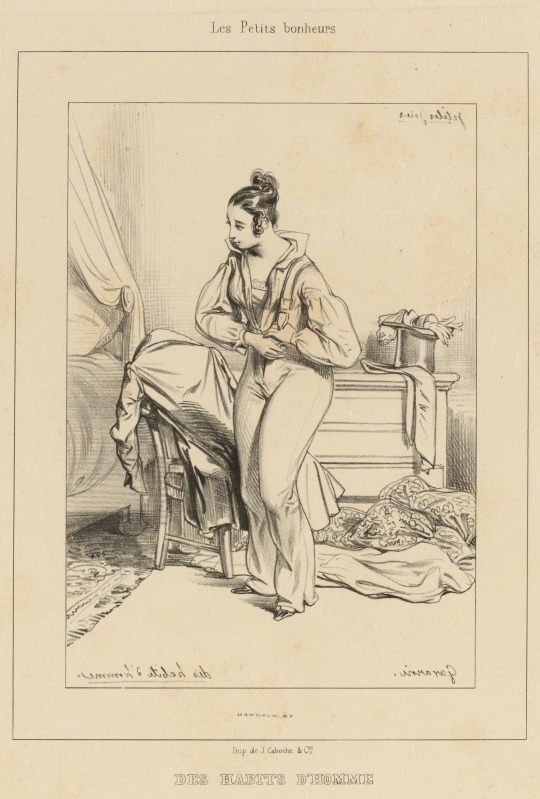
Des habits d'homme by Gavarni, 1837.
#paul gavarni#1830s#1837#historical men's fashion#men's fashion#crossdressing#gavarni stay winning#des habits d'homme#romantic era#july monarchy#a great look at men's intimate wear (on a woman!)#the hat and gloves on the dresser
390 notes
·
View notes
Text

The RAF Red Arrows release the red, white, and blue over Edinburgh
#RAF#Red Arrows#Edinburgh#King Charles III#Coronation#capital city#King of Scotland#monarchy#5 July 2023#UK
86 notes
·
View notes
Text
“France is in the throes of violent birth”: Thomas Jefferson and the 1789 French Revolution
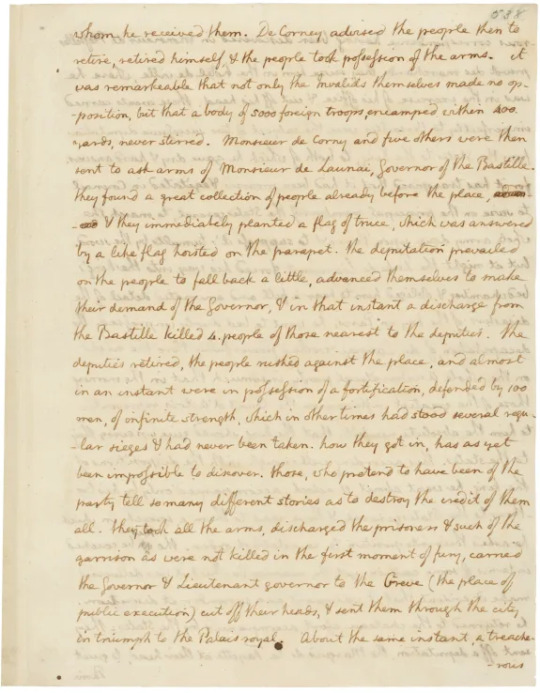
"The deputies retired, the people rushed against the place, and almost in an instant were in possession of a fortification, defended by 100 men, of infinite strength..."
• Ambassador Thomas Jefferson report on the events on 14 July 1789.
The excerpt shown here is from a letter in Jefferson’s own hand to Secretary of Foreign Affairs John Jay. In great depth, he describes the events of July 14, 1789, including the storming of the Bastille in Paris. The Bastille was a symbol of the old regime, and housed arms, gunpowder, and prisoners.
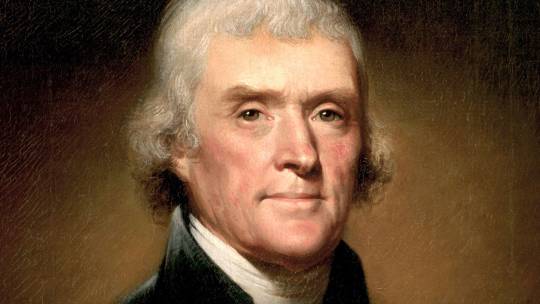
On 14 July 1789, the U.S. Ambassador to France, Thomas Jefferson, was a witness to the events of a day in Paris that is commonly associated with the beginning of the French Revolution. Jefferson recorded the events of the day in a lengthy and detailed letter to John Jay, then Secretary of Foreign Affairs.
The American Revolutionary War began as a conflict between the colonies and England. In time, what began as a civil disturbance turned into a world war drawing France, Spain, and the Netherlands into the hostilities. France would send troops, ships, and treasure to support the American effort. During the war, one of the first priorities of the French government and its allies was to raise funds to fight the war.
When the Treaty of Paris was signed in 1783, France was virtually broke and on the edge of social catastrophe, the result of decades of war with England and other countries. The poor suffered hunger and privation. By 1789, revolution would come to France.

In 1785, Thomas Jefferson arrived in Paris to replace Benjamin Franklin, who was retiring as ambassador to France. At the age of 81, Franklin returned to the United States where he would serve as President of the Pennsylvania Assembly and also participated in the Constitutional Convention of 1787.
John Adams was reassigned to London where he would be the first American ambassador to the Court of St. James. Jefferson remained on duty in France until late 1789 when he returned to the United States. While in France, Jefferson reported on developments at the court of King Louis XVI, the country at large, and the rest of Europe.
Jefferson was sympathetic to the revolution, opening his home in Paris to its leaders and assisting his friend the Marquis de Lafayette with drafting the Declaration of the Rights of Man. As the first Secretary of State under the Constitution and George Washington, his support for France and the revolution continued.
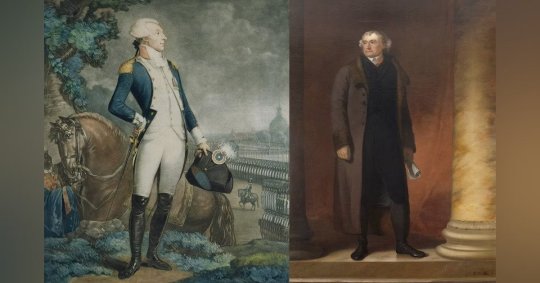
His friendship to the Marquis de Lafayette, who served in the War of Independence and lived almost 10 years in the USA, became very important in the beginning of the French revolution. The Marquis was the General of the french forces 1789 and tried to prevent a civil war and turmoil. He corresponded with Jefferson, who came from a country with the same experiences. Jefferson and the Marquis agreed that France was not mature to become a republic but a constitutional monarchy, like in Great Britain. However, this was the decision of the national assembly, of which the Marquise was a member. Jefferson went daily to Versailles to inform himself about the decisions. During Jefferson’ s visits, they passed the following laws:
1. Freedom of the person by habeas corpus
2. Freedom of conscience
3. Freedom of the press
4. Trial by jury
5. A representative legislature
6. Annual meetings
7. The origination of laws
This totally fit to Jefferson’s principles. In addition, there was passed a bill, which was prepared by Lafayette and Jefferson and which abolish any title or rank to make all men equal.
Thomas Jefferson also helped his friend Lafayette to bring the different opinions in his party about the constitution to an agreement. France should become a constitutional monarchy.
However, after this, Jefferson recognised that he is not allowed to interfere in the French domestic affairs and that he should be neutral and represent his country. He left France in the thinking that the Revolution was over and that France would grow to a constitutional monarchy. Jefferson was proud of the achievements in France and after his return to USA he declared: “ So ask the travelled inhabitant of any nation, In what country on earth would you rather live? - Certainly, in my own where are all my friends, my relations, and the earliest and sweetest affections and recollections of my life. Which would be your second choice? France."
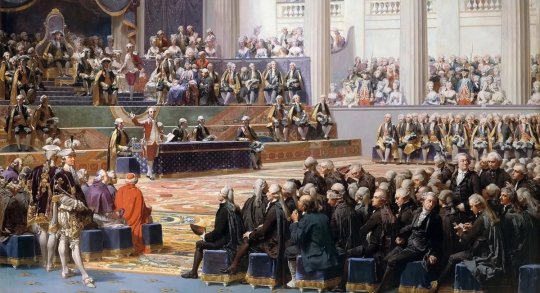
For all his francophile fervour, as the chief American diplomatic representative, Jefferson’s Enlightenment had been a conventionally English one, dominated above all by John Locke. And Jefferson’s first impressions of America’s principal ally in the Revolution were not positive ones. “The nation,” he confided to Abigail Adams in 1787, “is incapable of any serious effort but under the word of command.”
The stars of the French Enlightenment - Voltaire, Diderot, d’Holbach - were frivolous and useful only for manufacturing “puns and bon mots; and I pronounce that a good punster would disarm the whole nation were they ever so seriously disposed to revolt.”
The events of the spring of 1789 soon changed all of that before Jefferson’s very eyes. “The National Assembly,” he excitedly wrote to Tom Paine, “having shewn thro’ every stage of these transactions a coolness, wisdom, and resolution to set fire to the four corners of the kingdom and to perish with it themselves rather to relinquish an iota from their plan of a total change of government” had excited Jefferson’s imagination as nothing before.
Even when the Paris mob seized the Bastille and beheaded the hapless officers of the Bastille, Jefferson shrugged it aside as a mere incident, since “the decapitations” had accelerated the king’s surrender. As Jefferson would write later, “in the struggle which was necessary, many guilty persons fell without the forms of trial, and with them some innocent.” But rather than seeing the French Revolution fail, “I would have seen half the earth desolated. Were there but an Adam and an Eve left in every country and left free, it would be better than as it now is.”

Jefferson’s admiration for the French Revolution seemed to increase in direct proportion to his distance from it. And once he returned to America at the end of 1789, one of his chief motives for taking the post of Secretary of State was to observe and encourage the French eruption, when the National Assembly seized and redistributed the lands of the Catholic Church, when the king foolishly attempted to flee France, only to be captured, placed on trial and executed.
And when a Committee of Public Safety began a national purge - the “reign of terror” - Jefferson continued to describe the French Revolution as part of “the holy cause of freedom,” and sniffed that “the tree of liberty must be refreshed from time to time with the blood of patriots and tyrants. It is its natural manure.”
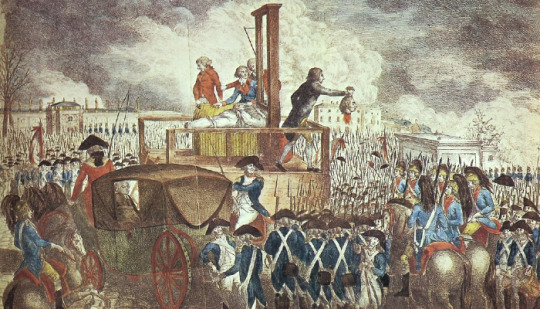
There is no question that Jefferson’s influence in the beginning of the French Revolution was very important. His initial moderate counsels and ideas helped in the beginning to prevent a civil war. His opinion that France was not mature to become a republic is probably right, because after 600 years of monarchy and aristocracy they people were not used to have any rights or take part in political matters. Jefferson thought that a republic had to develop from a constitutional monarchy. When you look to the cruel end of the French Revolution, Jefferson’s assessment was right up to a point.
Jefferson’s time as Secretary of State coincided with the most explosive phase of the French Revolution. What started as an attempt to dismantle the Ancien Régime and institute a constitutional monarchy blossomed into a radical experiment in creating an entirely new republican society. As his correspondence with Minister to France Gouverneur Morris and Minister to the Netherlands William Short during the emergence of the Jacobin Terror reveals, Jefferson responded to the violent radicalisation of the Revolution with enthusiastic support.
His advocacy for the French Revolution did not signify his emergence as a disruptive insurrectionist in favour of purposeless violence, anarchy and unbridled populism. Instead, he advocated for recognition and support of the Jacobin government as a successful international analog to the republican project he wanted to pursue at home at the expense of the “monarchical” aspirations of Hamilton and the Federalists.
In practice, the parallels he imagined between the ideal Jeffersonian and Jacobin republics were usually more apparent than real, as Jefferson often ignored the reports of Morris and Short in favour of fanciful idealising of his French counterparts – a problem Jefferson would only come to grips with in retirement.
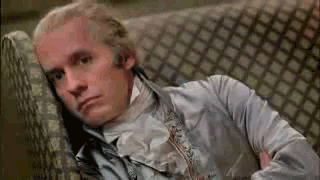
Despite these dilemmas, Jefferson’s impassioned advocacy for the French Revolution proved effective, emerging as a cornerstone of the burgeoning Republican Party’s foreign policy and remaining important well into the early nineteenth century, until the Revolution ceased to be an important political issue. It was not until he became President in 1801 that Jefferson’s views toward France began to cool and became more pragmatic, highlighted by the Louisiana Purchase Treaty.
#thomas jefferson#jefferson#french revolution#14 july 1789#bastille day#america#france#french#monarchy#republic#history#politics#ideology#jacobin#essay#diplomacy#ambassador#jefferson in paris#paris
59 notes
·
View notes
Text
listen, instead of continuing with the current royal family and instead of abolishing the monarchy altogether, let us just start brand new with a new bloodline.
a proper bloodline.
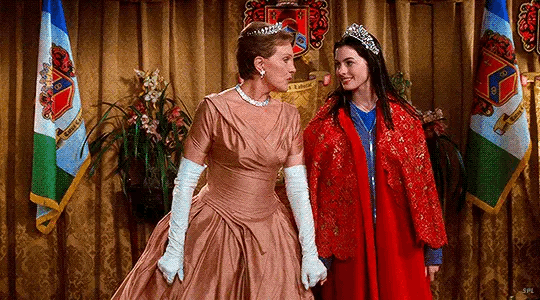
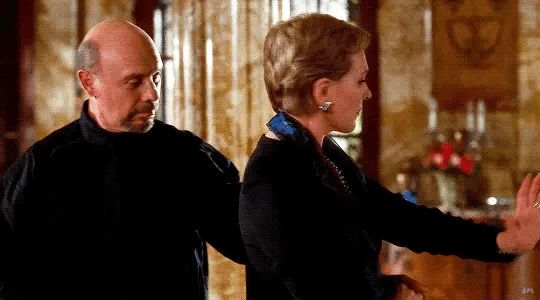

my royal family
#princess diaries#Julie Andrews#anne hathaway#hector elizondo#princess diaries two#the princess diaries#princess diaries 2#queen elizabeth ii#the queen#royal monarchy#the royal family#queen Elizabeth#brf#Britain’s royal family#crack 🍰💫🌼🦘🎨🎖💋🦋👑🦄🥂🍪☕️🍻🧋#300
360 notes
·
View notes
Text

Happy Fourth Of July Americans!
#sorry about the thing#I don’t blame you I don’t like kings either#despite my main blog being about a load of kings#abolish the monarchy#buster keaton#the navigator#the navigator 1924#fourth of july#independence day#silent movies#comedy
44 notes
·
View notes